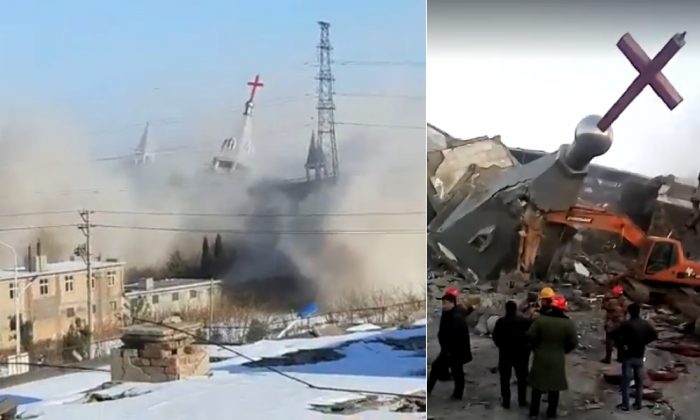Video uploaded by advocacy group ChinaAid shows destruction of the Golden Lampstand Church in January 2018.
A visitor to one of Beijing’s large or historic churches may, at first glance, have difficulty understanding frequent discussions of the suppression and persecution of Christians in China. However, an observer of the government’s Zhejiang cross destruction campaign or the January 2018 demolition of the Golden Lampstand Church would be astounded that this persecution is even in question.
This confusion likely stems from the fact that pressure on Chinese Christians is not just overt persecution (e.g. church demolition, cross removal) but also includes more subtle restrictions (registration, monitoring, and control over leadership). In light of these varying pressures, Christians have developed various forms of response.
Unregistered or “house” churches work outside government-sanctioned Three Self Patriotic Movement Church (TSPM) and Catholic Patriotic Association (CPA), in order to keep their religion uncontaminated by state interference in their theology, leadership, preaching, and activities. House church leaders do so at the risk of ending up like Cai Zhuohua, who was sentenced to prison for business crimes because he refused to operate within the parameters of the state. However, not all Christians work outside government scrutiny. Yang Fenggang in his article “From Cooperation to Resistance: “Christian Responses to Intensified Suppression in China Today”, highlights how Chinese Christians respond to restriction and persecution of the state from both within and without state-sanctioned organizations.
Yang, a scholar of the Under Caesar’s Sword project, studied Chinese Christians’ diverse responses to the various types of persecution they face. Within the TSPM and CPA, not all members are passive individuals ready to embrace the directives of the state. While some Chinese Christians believe the Chinese Communist Party (CCP) is good for Chinese Christianity, some Christians join state sanctioned churches knowing they will likely have to resist from within. Gu Yuese, a TSPM pastor initially compliant with the anti-cross campaign in Zhejiang, wrote an open letter of protest once the campaign got out of hand (84). State-approved bishops, who contrary to Catholic tradition, are chosen by the state and not the Vatican, will secretly seek the blessing of the Pope after their ordination (80).
Such acts of resistance within the church are likely to continue. As Yang states, “In recent years, not only house churches have grown rapidly in urban areas, more and more Christians have taken up challenging authorities through legal means”. It remains to be seen exactly how Christians will respond to increasing state persecution and restrictions under Xi Jinping. One thing is certain — such resistance will not be uniform as it takes place under the watchful eyes of the state.
THE RFI BLOG

Does Southeast Asia Lead the World in Human Flourishing?

RFI Leads Training Session on Religious Freedom Law and Policy for U.S. Army War College

Oral Argument in Charter School Case Highlights Unconstitutional Motives Behind OK Attorney General’s Establishment Clause Claim

Largest Longitudinal Study of Human Flourishing Ever Shows Religion’s Importance

Keys To Human Flourishing: Faith And Relationships Outweigh Wealth
CORNERSTONE FORUM

Reaffirming Religious Freedom: Bridging U.S. Advocacy and Iraq’s Constitutional Framework

Political Polarization, Same-Sex Marriage and Religious Liberty

Bridging the Gap Between International Efforts and Local Realities: Advancing Religious Freedom in the MENA Region

Challenges to Religious Freedom in Iraq and the Critical Need for Action


